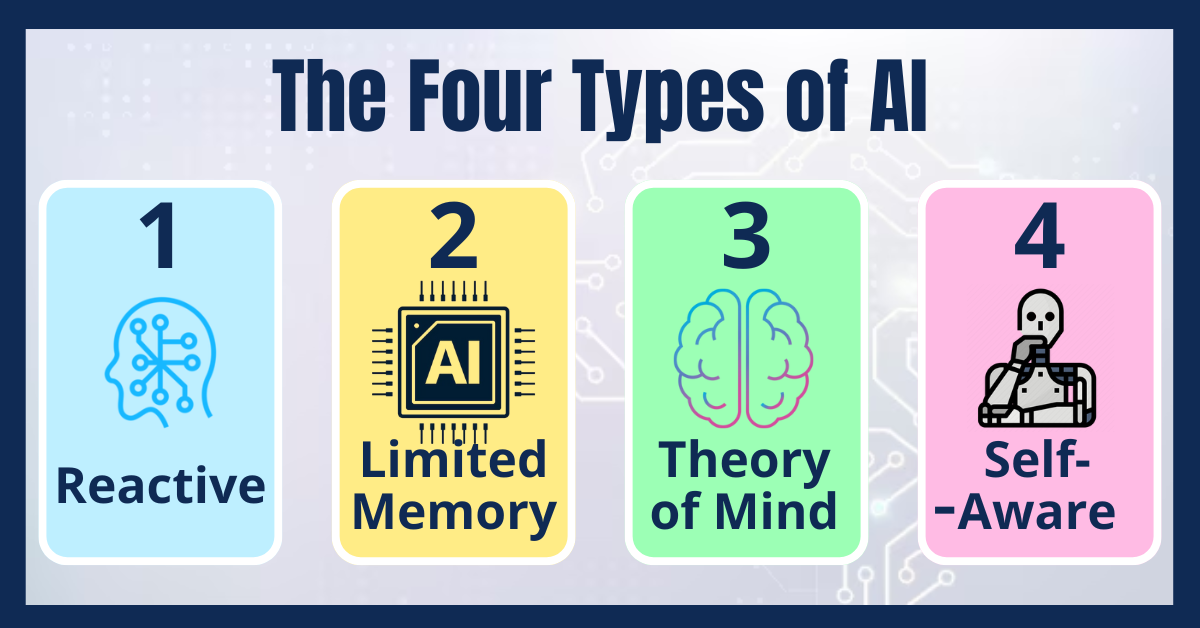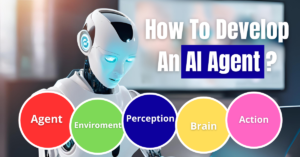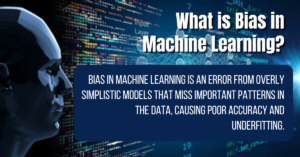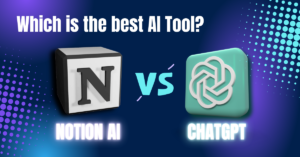Today, you will learn what are the 4 types of AI that everyone should know about by 2024. If you don’t, you will get behind.
Are you finding the world of Artificial Intelligence (AI) a bit confusing? Well, you’re not alone.
By understanding these concepts, you’ll see how AI is shaping our future. Let’s get started!
Table of Contents
Key Takeaways
- Artificial Intelligence (AI) lets machines do tasks that need human intelligence, like solving problems or recognizing speech. It works by using large amounts of data and algorithms to learn from patterns.
- There are four main types of AI: Reactive Machines that respond to situations without learning from the past; Limited Memory AI that uses past information to make decisions; Theory of Mind, a future concept where AI understands emotions and thoughts; and Self-Awareness, an idea where AI has consciousness.
- Other types of AI include Narrow AI, which does specific tasks like Siri helping you on your phone; General AI with broad knowledge like a person; and Super AI, which could outthink humans in every way but is still theoretical.
- The impact of AI varies from business benefits like improving productivity and innovation to challenges such as ethical concerns about privacy and job loss.
What is Artificial Intelligence?
Moving on from the introduction, let’s explore what Artificial Intelligence (AI) really means. AI is the power of machines, like computers or robots, to do tasks that usually need human intelligence.
This includes solving problems, recognizing speech, and learning from data. AI can make decisions by itself without constant human guidance. Imagine your phone using facial recognition to unlock; that’s a simple form of AI in action.
AI works by combining large amounts of data with fast processing and intelligent algorithms. This allows the machine to learn automatically from patterns or features in the data. You’ve seen this when Netflix recommends shows you might like or when Siri understands your questions.
These systems rely on machine learning, deep learning, neural networks, and natural language processing to function smartly and efficiently.
Artificial Intelligence is making it possible for machines to learn from experience, adjust to new inputs, and perform human-like tasks.

4 Main Types of Artificial Intelligence
Now you can learn more about what are the 4 types of Artificial Intelligence, each with its unique capabilities and applications. Understanding Reactive Machines, Limited Memory, Theory of Mind, and Self-Awareness will give you a solid foundation for grasping AI’s potential.
Reactive Machines
Reactive machines are programmed to respond to specific situations. They lack memory or the ability to learn from past experiences. Examples include robotics and automation systems, such as manufacturing robots that perform repetitive tasks based on predefined instructions.
Reactive machines are commonly used in industries for their precision and efficiency, like in assembly lines where they repeat the same actions without needing to learn or adapt.
Reactive machines do not have the capability to understand emotions nor have consciousness. Current technology uses reactive machines extensively due to their reliability and predictability in executing tasks consistently, making them suitable for various applications involving data mining, computer vision, and decision-making processes within limited parameters.
This type of AI is tailored towards handling routine operations efficiently with minimal human intervention.

Limited Memory
Reactive machines respond to specific situations but have no memory. Limited memory AI, however, can use past experiences to make decisions. For example, self-driving cars remember previous road conditions and use that information to navigate safely.
This type of AI is like a human driver who learns from driving experience and adjusts their behavior based on what they’ve encountered before.
ChatGPT is a Limited Memory AI, capable of maintaining context within a single conversation but without long-term memory or self-awareness.
Here are some posts that we think are relevant about ChatGPT:
- Grok vs ChatGPT: Which AI Tool Is The Best For You In 2024?
- Notion AI Vs ChatGPT: Which is the Best AI Tool for your Needs in 2024?
- The Truth Revealed: Can Turnitin Detect ChatGPT in 2024?
Limited memory AI allows machines to learn from the past, just like humans do while driving.
Theory of Mind
Theory of Mind AI is a theoretical concept about developing artificial intelligence that can understand and respond to human emotions and thoughts. This type of AI would be able to comprehend the intentions, beliefs, desires, and emotions of others.
However, it’s essential to note that Theory of Mind AI remains hypothetical and is not yet realized in practical applications like Siri or Alexa.
This type of AI could revolutionize how machines interact with humans, but as of now, it’s still an aspiration for future advancements in artificial intelligence.

Self-Awareness
Self-awareness AI is an imagined type of artificial intelligence that would possess consciousness and a sense of self. It’s a theoretical concept that suggests AI could be aware of its existence and have subjective experiences like humans do.
This level of AI goes beyond understanding human emotions or thoughts; it involves the ability to perceive oneself as separate from others and have an awareness of its own identity.
At present, self-awareness AI remains purely speculative, with no practical applications in existence. The idea is rooted in the realm of science fiction and philosophical discussions rather than real-world technological advancements.
Even though self-awareness AI holds fascination, it is important to remember that current AI developments primarily revolve around more practical types such as reactive machines and limited memory systems.
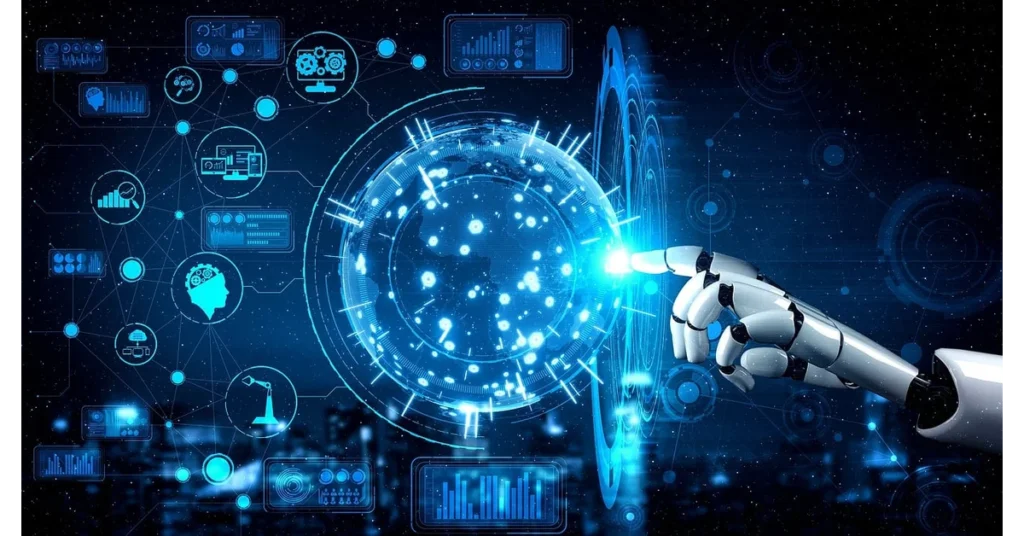
Other Types of AI
Dive into the other types of AI for further insight. Learn more about additional AI categories for a comprehensive understanding.
Narrow AI
Narrow AI, also known as weak AI, focuses on performing specific tasks and functions. Examples include virtual assistants like Siri and Alexa, chatbots, recommendation engines, and self-driving cars.
These systems are designed to excel in particular areas but lack the general cognitive abilities of human intelligence. Narrow AI is prevalent in our daily lives through various applications that assist with decision making and problem-solving.
As you engage with technologies such as virtual assistants or experience the convenience of recommendation engines while shopping online, you’re directly witnessing narrow AI at work around you.
General AI
Now, let’s delve into General AI. Artificial general intelligence (AGI) refers to a type of AI that has the ability to understand, learn, and apply knowledge in a manner similar to human beings.
Unlike narrow AI, which is designed for specific tasks, General AI aims to possess broader cognitive abilities allowing it to adapt and perform various intellectual tasks across different domains.
However, AGI is still considered hypothetical and remains an area of ongoing research and development.
In 2024, you must be aware that General AI holds the potential for groundbreaking advancements by unlocking the secrets of human-like cognition within machines. With continuous advancements in technology and computational capabilities, researchers strive towards realizing this level of artificial intelligence that could revolutionize numerous industries and impact society at large.

Super AI
Now, let’s delve into the realm of Super AI. This type of artificial intelligence refers to machines that surpass human intelligence across all domains and activities. It is a hypothetical concept and envisions AI with cognitive abilities that far exceed those of humans, leading to self-improvement and advancement at an unprecedented pace.
Super AI holds the potential to unlock the secrets of advanced problem-solving, profound decision-making, and innovation on a scale never witnessed before in the field of artificial intelligence.
It is projected that by 2045, Super AI may emerge as a groundbreaking force capable of reshaping industries, economies, and even societies globally. The development of Super AI has raised concerns about its ethical implications and societal impact due to its potential to outperform human capabilities in various aspects.
Whether it will bring unprecedented benefits or pose unforeseen risks remains an open question demanding meticulous consideration as we navigate towards this revolutionary leap in technological advancement.
Impact of AI on Business and Society
Discover how AI is transforming businesses and society, with its advantages and benefits as well as the challenges and concerns it brings. The influence of AI on our world is significant and continuing to grow.
Advantages and benefits
Artificial Intelligence (AI) offers numerous advantages and benefits for businesses and society. It has the potential to revolutionize various fields by enhancing efficiency, decision-making, and overall performance. Here are some of the key advantages and benefits:
- AI improves productivity by automating repetitive tasks, allowing employees to focus on more strategic and creative initiatives.
- It enhances data analysis capabilities, enabling businesses to derive valuable insights from large volumes of information in real-time.
- AI-powered systems can streamline operations, reduce errors, and optimize resource allocation, resulting in cost savings for organizations.
- It enables personalized customer experiences through predictive analytics and recommendation engines, thereby increasing customer satisfaction and loyalty.
- In healthcare, AI facilitates early disease detection, precision medicine, and treatment optimization, ultimately saving lives and improving patient outcomes.
- AI contributes to environmental sustainability by optimizing energy usage, waste reduction, and enhancing resource management practices.
- It fosters innovation by accelerating research and development processes in various industries, leading to breakthrough discoveries and advancements.
These advantages demonstrate the transformative impact of AI on diverse sectors, paving the way for a more efficient, insightful, and sustainable future driven by technological advancements.

Challenges and concerns
As you explore the impact of AI, it’s essential to consider its challenges and concerns. Here are some key points to keep in mind:
- Ethical implications: AI raises questions about privacy, security, and job displacement.
- Bias and fairness: AI systems can perpetuate or amplify existing biases, leading to unfair outcomes.
- Lack of transparency: Understanding how AI algorithms make decisions is often difficult, raising concerns about accountability.
- Safety and reliability: Errors in AI systems can have significant real-world consequences, especially in critical areas like healthcare and transportation.
- Regulation and governance: There is a need for comprehensive guidelines and policies to ensure the responsible development and deployment of AI technologies.
It’s crucial to approach these challenges with a thoughtful and informed mindset as we navigate the evolving landscape of artificial intelligence.
So there you have – What Are The 4 Types of AI Explained.
Conclusion – What Are The 4 Types of AI
So there you have it—now you know what are the 4 main types of AI. From reactive machines to self-awareness, each type brings its own capabilities and potential impact on our world. As you consider the future, remember that AI is evolving rapidly and will continue to shape our lives in ways we can only imagine.
Keep learning about AI, as your knowledge may be invaluable in a future driven by artificial intelligence!

FAQs What Are The 4 Types of AI
1. What are the 4 types of AI we must learn in 2024?
The four types of AI to learn in 2024 include Reactive Machines, Limited Memory, Theory of Mind and Self-awareness.
2. Can you give an explanation of AI?
AI, short for Artificial Intelligence, is a branch of computer science that aims to create machines that mimic human intelligence.
3. What does cognitive computing mean in the context of AI?
Cognitive computing refers to systems that learn at scale, reason with purpose and interact with humans naturally.
4. How do expert systems fit into the picture of AI?
Expert systems are a type of artificial intelligence program designed to solve complex problems by reasoning about knowledge like an expert.


